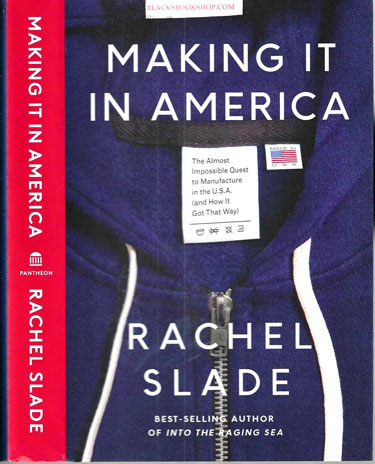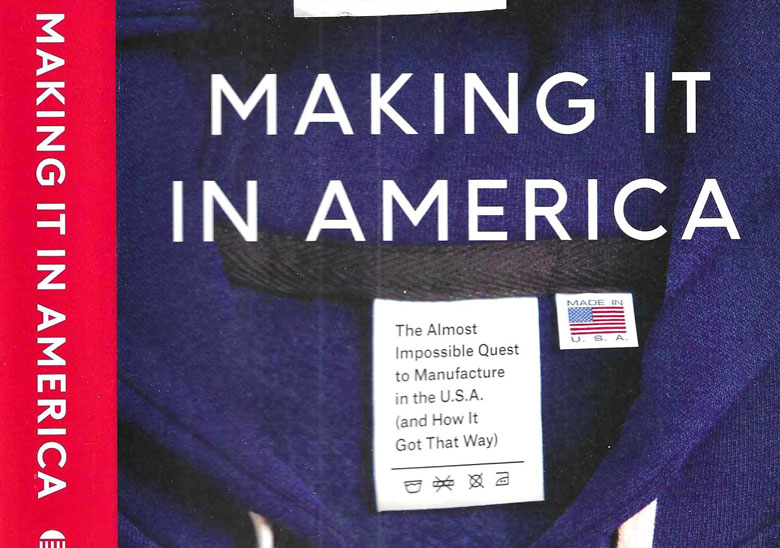Making It In America: The Almost Impossible Quest to Manufacture in the U.S.A (And How It Got That Way)
By Rachel Slade (Pantheon Books, 2023)
In Making It In America, a reader might expect to follow the not-so-easy process of procuring all American-made components, in this case for hooded sweatshirts made by American Roots in Maine. But author Rachel Slade wants to be sure you also pick up lessons in other wide-ranging topics.
For example, how New England’s textile mills relocated to the American South and then abroad, with more than a million jobs in that industry disappearing between 1990 and 2019 with displaced workers going into the service economy, at lower wages. Now, Americans are dependent on other nations for many basic needs: medicines, technology, vehicles, energy, furniture, and clothing.
That over-simplified summary does no favors to her hard work and extensive research. To her credit, Slade makes that history—including government regulation, unionization, and trade tariffs—both interesting and enlightening.
More sweatshirts are bought by Americans than anyone else, and nearly half the world’s sweatshirts are made in China, Bangladesh, and Vietnam.
But her book isn’t just a history. Slade wanted an example of what apparel manufacturing might look like in the U.S. when there are considerations other than profit. She felt she might be looking for a unicorn, but as someone who spends a lot of time in Maine (with a home in Rockport), Slade discovered American Roots, a company based in Westbrook, adjacent to Portland.
It was founded in 2015 by Ben and Whitney Waxman, who have committed to manufacturing apparel—primarily heavy-duty hooded sweatshirts—with every part made in America, and to running their company ethically, allowing unionization and providing a living wage, health insurance, paid sick leave, and vacation time.

Slade notes that more sweatshirts are bought by Americans than anyone else, and nearly half the world’s sweatshirts are made in China, Bangladesh, and Vietnam.
“Whenever we buy stuff made abroad, we leave a lot of questions unanswered,” she writes. “Was someone exploited to make that thing? Did they earn a living wage? Did they have the freedom to leave the factory when they needed to? Did they have access to protections in the factory, like masks or helmets? Did they have a safe place to report sexual harassment? Did they get regular breaks? Were they expected to work reasonable hours? What happened when they got sick or their children fell ill? Was the factory building even safe?”
She also describes how “buying foreign-made clothes allows us to ignore the environmental impact of our choices. It’s precisely that lack of regulation in developing countries that contributes to making some foreign goods so cheap to produce.”
I wouldn’t want to give the impression that the book is dry, or that it’s a diatribe. She has placed her concerns, ones shared with the Waxmans, in the context of a family story and how the Waxmans have managed the undertaking of American Roots.
Slade peoples the book with characters we get to know and care about. It is the same compelling technique she used in Into the Raging Sea, her award-winning first book on the sinking of the El Faro cargo ship. She included history of the shipping industry, how the ships themselves work, stories of the crew, and much more. Yet, it was an eminently readable book. Even knowing the outcome, I found it spellbinding.
Made in America, fortunately spared of a central tragedy of lives lost, may be a bit less dramatic, but as with Into the Raging Sea, it provides plenty of suggestions for policy changes to improve problem areas.
Slade’s way of putting a face on a fact-laden story, similar to Tracy Kidder’s and John McPhee’s nonfiction but with more of a pointed message, provides a visceral and energized experience for the reader.
Tina Cohen is a Massachusetts-based therapist who spends part of the year on Vinalhaven.





